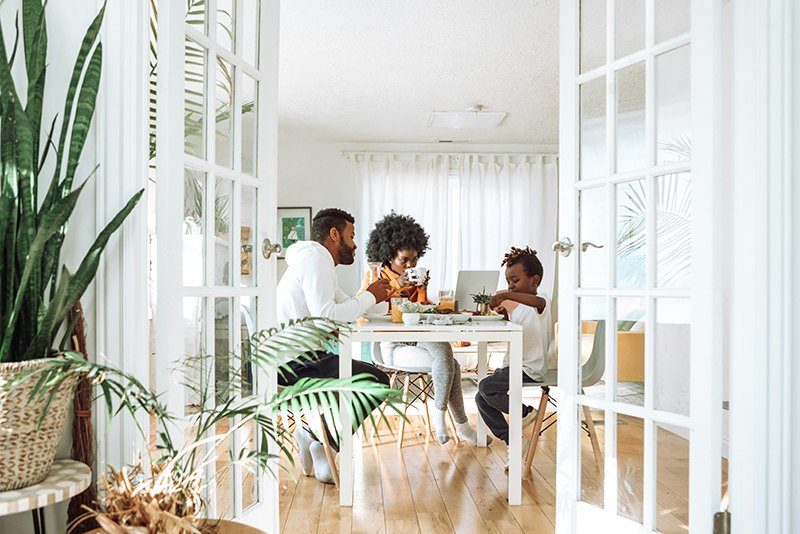
Tips After Buying a House
Teba Siles | · 7 min. read
Buying a house is a milestone that marks the start of a new chapter, filled with excitement and responsibility. While the journey to homeownership is often focused on closing the deal, the work doesn’t end once you’ve got the keys. Properly addressing key tasks after your purchase is essential to ensure a smooth transition into your new home. This guide will walk you through crucial tips after buying a house to help you settle in confidently and safeguard your investment for years to come.
- Table of contents
- Now That You Have Bought a Property – What Happens Next?
- 6 Essential Tips After Buying a House
- Final Thoughts: Ensuring a Smooth Transition
Now That You Have Bought a Property – What Happens Next?
Congratulations! You've completed the significant milestone of buying property. Now, it's time to turn your focus to what happens next. The process doesn’t end when you get the keys in your hand; there are key tasks and responsibilities that come with homeownership.
First, take a moment to appreciate the hard work that brought you to this point (especially if you're a firsttime home buyer), but then turn your attention to the next steps. Addressing the necessary tasks that need to be done after your purchase is essential not just for ensuring a smooth transition into your new home but protecting your investment at the same time.

6 Essential Tips After Buying a House
Buying the property is just the beginning of your homeownership journey. Below are six essential tips that will help you settle in, stay organized, and make the most of your new home.
1. Financial and Legal Responsibilities
Set Up Mortgage Payments
Ensure your mortgage payments are automated or set reminders to avoid missing deadlines. Don’t forget to budget for additional expenses like property taxes and homeowners’ insurance to stay financially prepared. Being on top of your finances is an essential part after buying a house.
Register Your Property
One crucial step after buying a house is to register your property and updating the necessary details. Your lawyer can assist you with changing the name and bank information on utility and community bills. Additionally, registration at the local property registry is essential to secure your ownership rights. Your lawyer can manage this for you to ensure all requirements are met. This process typically requires documentation such as:
- N.I.E. (the unique identification number issued by the Spanish authorities for non-Spanish national) and passport copies
- Confirmation of ITP tax payment
- The seller’s IBI tax payment copy
Understand Ongoing Property Expenses
As a homeowner, it's important to account for regular expenses, including:
- Community Fees: Applicable if your property is part of a development or complex. These fees, determined by the Community of Owners, can range from hundreds to thousands of Euros annually.
- Property Ownership Tax (IBI): A tax based on the administrative value of the property. Residency status may influence the amount owed.
- Garbage Tax: This municipal solid waste disposal fee averages around €300 per year.
Know Your Tax Obligations
Property ownership in Spain comes with specific tax responsibilities:
- Non-Resident Owners: Pay income tax based on the property’s value or a fixed rate if it’s not rented. Rental income must be declared and taxed.
- Resident Owners: Pay income tax based on annual income, with rates varying by region.
Understand Local Regulations and HOA Rules
Familiarize yourself with any local laws or homeowners’ association guidelines. Compliance with rules regarding property maintenance, renovations, or parking can help you avoid fines and ensure harmony with your community. This is one of the often overlooked but vital tips after buying a house.
2. Securing Your New Home
Change the Locks and Update Security
Your new home should be a haven, and security is a top priority which you should do immediately after buying. Start by rekeying or replacing all locks, as you can’t be certain who might still have a copy of the old keys. Consider upgrading your security system with smart locks, surveillance cameras, or a monitored alarm system for added peace of mind.
Inspect the Property Thoroughly
Even if your home inspection went smoothly before closing, it’s wise to conduct a final walk-through. Look for any overlooked issues, such as leaks, faulty electrical outlets, or structural concerns. Address maintenance tasks, promptly fixing plumbing or electrical problems early can prevent costly repairs later. Taking these steps and prioritizing them is important to protect your investment.
3. Organizing Documentation and Utilities
Update Your Address and Legal Documents
Notify essential institutions of your address change, including the post office, banks, insurance providers, and subscription services. It’s also crucial to update your property deeds and homeowner’s insurance information to reflect your new ownership.
Set Up Utilities and Services
Contact utility providers to transfer or initiate services like water, gas, electricity, and internet. Ensure everything is set up before moving day to avoid interruptions. If necessary, shop around for the best plans to suit your needs and budget. Keep in mind that managing utilities is a key step in post-purchase planning.
4. Settling Into the Neighborhood
Connect with Neighbors
Introduce yourself to your neighbors—it’s an excellent way to build community ties and foster a sense of belonging. Building relationships can also contribute to a safer environment, as neighbors often look out for one another.
Familiarize Yourself with Local Amenities
Take time to explore your new neighborhood. Locate nearby essentials such as grocery stores, schools, healthcare facilities, and recreational areas. Learning about these amenities will help you settle in and make the most of your new community. Embracing your surroundings is a rewarding part of following tips after buying a house.
5. Personalizing Your Space
Unpack and Prioritize Essentials
Moving in can feel overwhelming, but prioritizing your unpacking can make the process smoother. Start with essential areas like the kitchen, bathrooms, and bedrooms. Organizing your belongings in these spaces first will make the rest of your home more functional.
Plan Renovations or Updates
Assess the areas you’d like to improve to make your house feel like home. Whether it’s repainting walls, upgrading appliances, or landscaping, set a clear budget and timeline. Tackling one project at a time ensures your updates are manageable and aligns with what you envisioned.
6. Long-Term Property Maintenance
Create a Home Maintenance Schedule
Establish a routine for maintaining your home, including tasks like cleaning gutters, servicing HVAC systems, and conducting pest control. Investing in basic tools for minor repairs can save time and money. Proactive care is one of the most valuable tips after buying a house for preserving your property’s value.
Build an Emergency Fund
Unexpected repairs are inevitable, so it’s wise to set aside a fund for emergencies like roof leaks or appliance breakdowns. A financial safety net can reduce stress when surprises arise and is a key recommendation after buying a house.

Final Thoughts: Ensuring a Smooth Transition
Transitioning into a new home is an exciting journey, but it comes with responsibilities. By being proactive with tasks like securing the house you just brought, organizing utilities, and maintaining the property, you’ll set yourself up for long-term success.
Key Takeaways:
- Prioritize financial and legal tasks, including setting up mortgage payments and understanding local regulations.
- Secure your home by changing locks and updating security systems.
- Organize utilities and documentation to ensure a smooth transition.
- Build community ties by connecting with neighbors and exploring local amenities.
- Personalize your space through thoughtful unpacking and planned updates.
- Commit to regular maintenance and create an emergency fund to protect your investment.
Embrace the joys of homeownership with these tips after buying a house as your guide. For more insights and resources, don’t hesitate to contact us. We're committed to providing you with comprehensive support and ensuring your property ownership experience is both successful and rewarding.